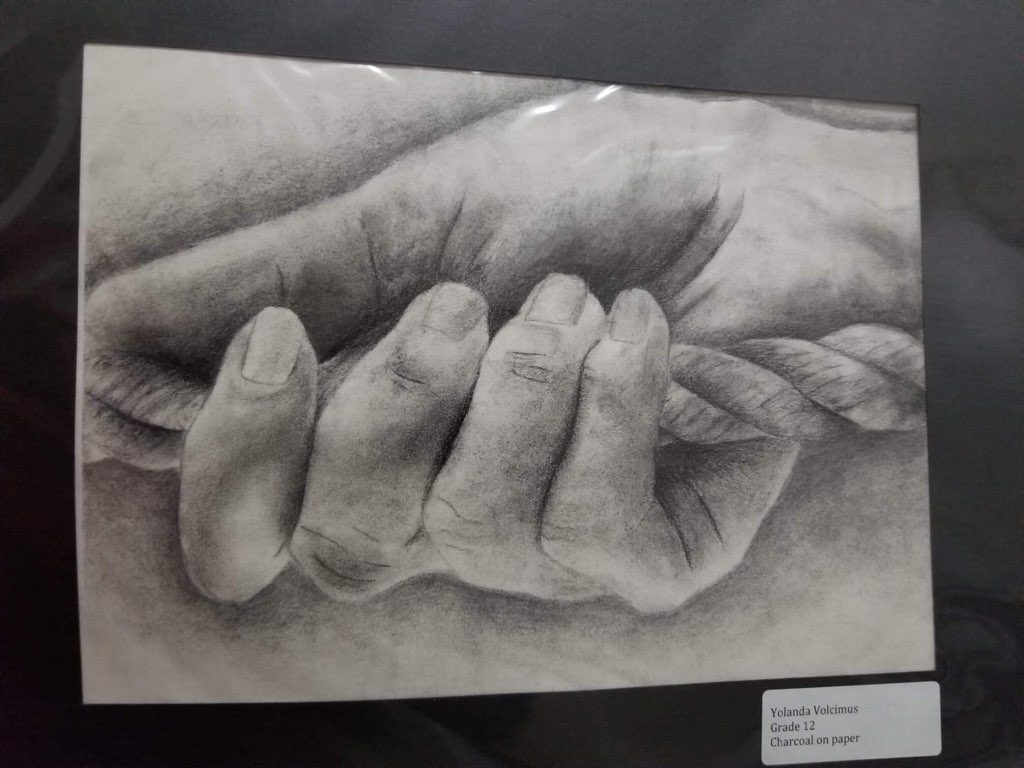One of Yolanda Volcimus’ pieces showcased on the Art Gallery at York. Photo credit: Anslem Joseph.
By Anslem Joseph
Yolanda Volcimus, 20, a Health Science major at York expresses her views of social problems in the African-American community through her art. In her art, she displays issues such as gun violence, domestic abuse, police brutality, and racism in the Crown Heights and East Flatbush communities.
Volcimus grew up in Trouin, Haiti and witnessed cases of domestic abuse and violence within her own family. She also witnessed a neighbor physically abusing his wife. Although these social issues were not directed at her, she feels the need to address the problems that, to her, happen too frequently in African-American communities. She was particularly motivated by a domestic violence incident that happened to her neighbor who got shot in the back.
“There was even a time when there was a shooting two blocks from my house and that could have been me or one of my family members,” said Volcimus. “This is why I draw about these issues. By drawing attention to these issues, people can become more aware and get involved. We can come together to help solve these issues in our communities”
Although these issues never personally affected Yolanda, she feels the need to address these problems because they have been happening too frequently in African American communities. Yolanda recalls the time the topic of gun violence became relevant to her and her community.
Marie Massier, 19, a BioInformatics Major at New York City College of Technology, regards Volcimus as a talented artist and an irreplaceable friend.
“One of her best qualities is how caring she is towards her friends and family,” said Massier. “If you’re doing bad she’ll find a way to help you get back on your feet.”
Most people would be traumatized by such negativity in the environment, but Volcimus became motivated to want better for herself and improve her environment through her artwork.
Imagery became a big part of Volcimus’ journey to create a better environment for herself. When she immigrated to the United States at the age of 10, Volcimus could only speak Creole and she could not understand the language the cartoon characters were speaking. As a result, she paid more attention to the visuals and colors of cartoons so she decided that she wanted to draw them.
“I started off drawing cartoon characters such as Dora, and I eventually got better,” said Volcimus. “With the help of YouTube, I was able to elevate my drawing skills to new levels because YouTube was my only teacher.”
Sara Guerrero, the Director of Education & Public Education at No Longer Empty, Inc., commends Volcimus for her dedication in gathering, and representing the stories and lives of people in her community.
“Yolanda’s professional work on her art projects contributed to a public visual report featuring local stories and demographics,” said Guerrero. “Having worked closely with Yolanda, we observed the thoughtful insights and dedication she brings to her work, as well as the kind guidance and feedback she often offered to her peers.”
In 11th grade, Volcimus was in an art contest by a program called the Youth Organizing to Save Our Streets, YOSOS. The contest consisted of creating art that speaks to the issues in their community and to put a solution to the problems in the art. Volcimus drew a portrait of Trayvon Martin to show racial injustice and police brutality.
A year later, Volcimus re-entered the contest and drew a portrait of a disappearing African-American male in the army who is standing in front of a bleeding American flag. On the left side of the picture, Yolanda drew struggles that African Americans face every day such as police brutality and use of illegal drugs. She also added a quote from Dr. Martin Luther King Jr. in the bottom right of her portrait.
“Is it a coincidence tobacco companies pay more attention to low socioeconomic status areas?” Yolanda said when describing her portrait. “Is it really a coincidence black males get sentenced to more years than whites? Black men have become the prey of America. They are slowly disappearing.”
Volcimus said that people need to be aware and bring light to these controversial topics in their neighborhoods, communities, and urges Congress to help create change in the justice system. She hopes that her art reaches people from around the world so that the conversation about injustice goes beyond America and inspires other countries to start correcting the injustices in their justice systems.
“I want to have an art gallery for profit or non- profit so that I can sell my art and people can understand and see the message of my art,” said Yolanda. “I want to improve on my skills so my art can look hyper-realistic. I also want to make a program for kids who want to learn to become artists.”


